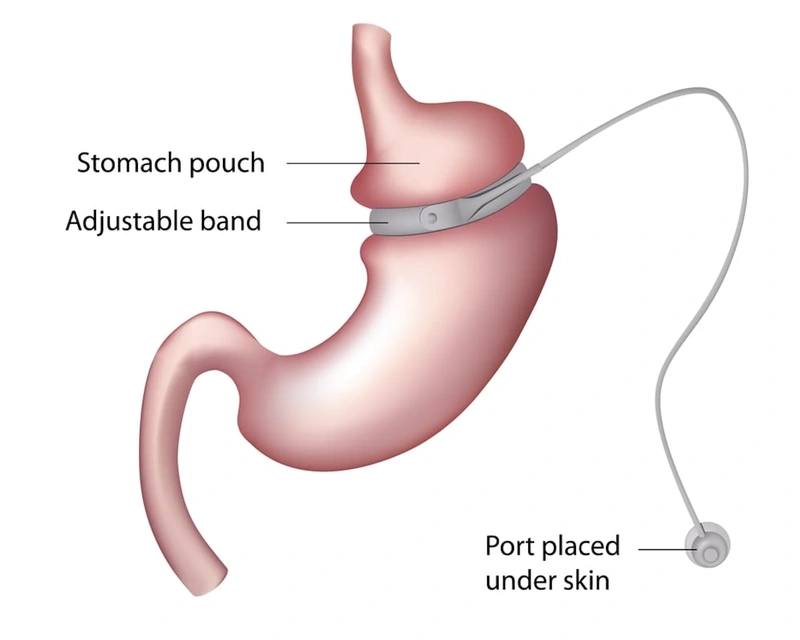
Gastric Band
Gastric band or adjustable gastric banding surgery is a surgical procedure used to treat obesity by reducing the size of the stomach.
GASTRIC BAND SURGERY
During the gastric banding procedure, a silicone band is placed around the upper part of the stomach, creating a small pouch. This pouch limits the amount of food the stomach can hold, leading to a feeling of fullness with smaller portions of food. The band has an inflatable balloon on the inner side, which can be adjusted by adding or removing saline solution through a port placed under the skin.
The main goal of gastric banding is to reduce food intake and promote weight loss. By limiting the amount of food that can be consumed at one time and slowing down the emptying of food from the stomach, gastric banding can help individuals feel satisfied with smaller meals and reduce their caloric intake.
PROS OF GASTRIC BAND SURGERY
-
Less Invasive: Gastric banding is a minimally invasive procedure compared to some other weight loss surgeries. No changes made in gastro-intestinal system.
2. Adjustable: The band can be adjusted postoperatively to control the amount of food that can pass through the stomach. This adjustability allows for a personalized approach to weight loss.
3. Reversible: Gastric banding is reversible procedure. The band can be removed if necessary, restoring the stomach to its original size.
4. Lower Risk of Nutritional Deficiencies: Because gastric banding does not involve rerouting the digestive system, there is a lower risk of nutritional deficiencies compared to procedures like gastric bypass.
CONS OF GASTRIC BAND SURGERY
-
Variable and less predictable Weight Loss: Weight loss outcomes with gastric banding can vary, and some individuals may not achieve the desired weight loss. Success often depends on adherence to dietary and lifestyle changes.
-
Adjustment and Maintenance: Regular adjustments (fills) of the band are necessary to achieve optimal weight loss means constant dependancy on medical services. The need for ongoing maintenance and follow-up appointments can be a drawback for some individuals.
-
High risk for Complications: While gastric banding is generally considered safe, there can be complications, including band slippage, erosion, or infection. Regular follow-up with healthcare professionals is crucial to monitor for and address any issues.
-
Potential for Band Removal: In some cases, the band may need to be removed due to complications or lack of effectiveness. The removal process, while reversible, still involves an additional surgical procedure.
-
Less Effective for Certain Conditions: Gastric banding may be less effective for individuals with certain conditions, such as severe obesity or obesity-related health issues. Other weight loss procedures may be more suitable in such cases.
Like all weight loss surgeries, also gastric banding requires significant lifestyle changes, including dietary modifications and increased physical activity, to achieve and maintain weight loss.
While gastric banding may still be a viable option for some individuals, International bariatric surgeons community and healthcare professionals mostly consider other weight loss surgeries with more predictable outcomes and lower long-term maintenance requirements.
❌ Weight Loss Latvia and Sigulda Hospital do not provide and do not recommend gastric band as a good choice for permanent weight loss and long term health improvement.
Individuals considering bariatric surgery should thoroughly discuss the potential risks, benefits, and alternatives with their surgical team to make an informed decision based on their specific health history, needs and circumstances.
Please feel free to ask for a free consultation about all types of bariatric surgery!